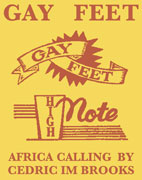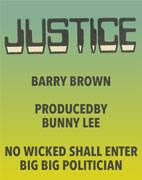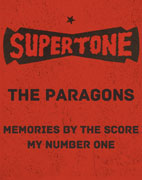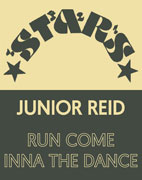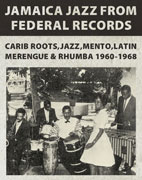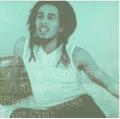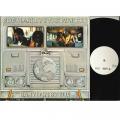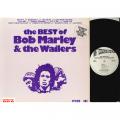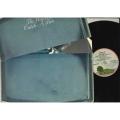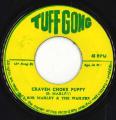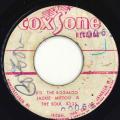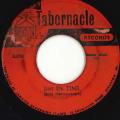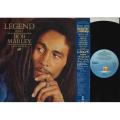Bob MarleyText by Jeremy Collingwood
Bob stands uniquely as the only person to be born into Poverty, on a small colonially owned Island and to become a major international Music star and an international celebrity. He bought the voice and beliefs of an exploited and subjugated race and class onto a world wide stage.
Bob Marley
| Real Name | Robert Nesta Marley |
| Born | Feb 6, 1945 |
| Died | May 11, 1981 |
| Place of Birth | Nine Miles St. Ann Jamaica |
| Related Artist(s) |
Like many children of the period Bob grew up with little parenting and was largely based in Kingston, Jamaica's capital – far away from his birth place of Nine Mile.
After a brief spell as a Welder Bob had always wanted to be a musician and like many a Kingston youth he would spend hours practising his music and going to see the US Soul & R'n'B acts that toured Kingston. His love of the radio, which came into the Island from Cuba and New Orleans, also fed into his musical soul.
Bob cut his first record at the age of 17, for the Beverley's(Beverleys) label, run by the Kong family who were Chinese Jamaicans. The 1962 track 'Judge Not' was inspired by the classic Old Testament admonishment but, like the follow up 'One Cup of Coffee', failed to sell. A young Jamaican born man of English stock, Chris Blackwell, released 'Judge Not' on his fledging Island records: in the next decade the two would form a powerful partnership.
Bob's career began properly when he, as part of The Wailers, signed to Clement 'Coxsone' Dodd(CS Dodd)'s Studio One set up, which had been recording artists since the late 1950's. The Wailers were Bob, childhood friend Neville 'Bunny' Livingstone(Bunny Wailer) and Peter Tosh. Over the next three years The Wailers cut over sixty sides for Dodd ranging from Gospel, to straight R'n'B covers to Ballads and of course Ska tracks. The Wailers became rising stars on the JA music scene as tracks like 'Simmer Down', 'One Love' and 'I'm Gonna Put It On' were hits on the growing Sound System scene. Bob was already the front man and some tunes were released as 'Bob Marley & The Wailers'. Dodd released an album, 'The Wailing Wailers', whose cover showed The Wailers in a pose heavily influenced by Southern Soul hero's The Impressions.
Dodd ran a royalty free operation thus the monies from hits accrued to Dodd, not the band and so despite Dodd's paternalistic relationship with Bob and the group, they decided to leave & set up on their own label. Bob had married (Alpha)Rita Anderson (Rita Marley) whilst at Studio One and they alongside Bunny & Peter formed 'Bob Marley & The Wailing Wailers' and set up their own Wail N Soul M imprint. From 1967 to around 1969 the group issued a slew of first rate Rock Steady style singles but the label eventually went bust. During this period they met and signed up with a label (JAD) and publishing company (Caymen) run by Kingston based, US citizens, Johnny Nash & Danny Sims. Johnny Nash took Rock Steady Pop to world with his 'Hold Me Tight' hit in 1968.
Until 1972 Bob remained signed to JAD and continued to record with JA producers, most notably Lee Perry, with whom the now 'Bob Marley & The Wailers' once again found success in Jamaica with tracks like 'Duppy Conqueror', 'Small Axe' 'Soul Rebel' and 'Sun is Shining'. The group were Rebels and were followers of the Rastafarian Faith – a cult that was growing as Jamaicans sort an identity outside of being an ex-British Colony.
In the US and the UK Danny Sims could not even get Radio play for a Reggae-pop cut of 'Bend Down Low' or indeed for1971's 'Concrete Jungle' – a track that would later become a calling card for Bob. Bob set up Tuff Gong records at 127, King Street and cut a fine series of singles that found a growing fan base in Jamaica but they did little business elsewhere and failed to be released as an album.
JAD assigned Wailers & The Wailers contract to Chris Blackwell's Island Records in 1972. By the time the newly christened 'The Wailers' released their first single on the label it was over the one hundredth single that Bob had released. Blackwell understood the importance of marketing and promotion and set about presenting Bob as a rebellious and revolutionary spirit to the growing, and musically hungry, numbers of students and trendy types that sort something new from their music. It was Bob's ability to work with Chris, and his plans, that enabled him to begin to build a new career. Though sales were slow 'The Wailers' began to grow in credibility and moved reggae into the 'serious music' arena and away from a novelty or tribal music.
Within a few years both Peter and Bunny had left the group and by 1974 the group had reverted to 'Bob Marley & The Wailers' – with The Wailers now being his backing band. Whilst Bunny & Peter both disliked the rigours (and low financial rewards) of touring and the demands of the press, Bob was able to keep his eyes on the prize. Rita now led the ' I Threes', Bob's powerful backing singers that featured Marcia Griffiths and Judy Mowatt – both of whom already had successful solo careers in JA. 1974 saw Bob move 'uptown' to 56, Hope Road, Chris Blackwell's then house. Tuff Gong had a new HQ and it remains the location of the Bob Marley Museum to this day.
The Island album 'Live' took Bob up another couple of steps into the mainstream Rock world and became very fashionable in London. By now the group were League One players but still had failed to sell records in large quantities, have chart hits or break in the US. Chris Blackwell kept the faith and in 1977's the 'Exodus' album spawned worldwide chart hits and propelled Bob Marley into the Premier Division of the world's Rock Stars. Over the next few years his long Dreadlocks, denim clothes, love of women, weed and Football became known around the globe. Indeed he was truly a global super star.
In Jamaica he headlined the 'One Love Peace Concert' that tried to stem the flow of CIA backed violence in Kinsgton and he famously got the two politicians, who lead the opposing / waring parties in Jamaica, to clasp hands on stage, with Bob the guiding force. It was a huge concert that emphasized the importance of Bob in a country being torn apart by international power politics and drugs.
It had taken Bob some fifteen years to find stardom but it only lasted some four years. 'One Love', 'Redemption Song', 'Could You Be Loved', 'Three Little Birds', 'No Woman No Cry' became known the full world over. Before he died he played at Zimbabwe's Independence party to an estimated 40,000 people. He was truly a hero to the developing (then called The 'Third') world.
In February of 1981 Bob Marley died of cancer. It's believed that he carried a melanoma under his big toe nail and by the late 1970's it had spread throughout his body.
Date Added: Jan 10, 2020
Copyright (C) 2024 Dub Store Sound Inc.
Related Item(s)
| Bob Marley, Wailers - Africa Unite The Singles Box Set( Tuff Gong EU)EX/SEW/marks CVR=EX+ |
| Bob Marley, Wailers - Best Of Bob Marley & The Wailers(Studio One US)LP=EX+/SEW CVR=EX/SOS |
| Bob Marley, Wailers - Catch A Fire (Zippo Sleeve)(Island UK)LP=EX-/SEW CVR=EX--/SSD |
| Bob Marley, Wailers - Craven Choke Puppy(Tuff Gong)EX/SACI/scuff |
B side) Wailers - Choke
| Jackie Mittoo - Do The Bogaloo(Coxsone)VG-/LD/WOL/stain/stamp |
B side) Bob Marley, Wailers - What Am I Supposed To Do
| Soul Harmonisers (Bob Marley) - Just In Time(Tabernacle)EX/SEW/SLD/stain |
B side) Penthecostal Singers - Sing Like The Apostles











